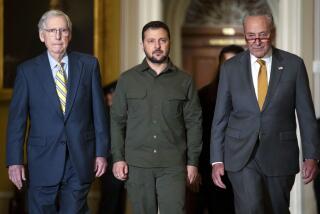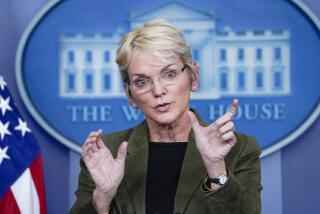McDonnell Aid Efforts Criticized : Defense: A Pentagon investigator says the Air Force’s plan may have violated the law. Defense officials say John McDonnell threatened to stop work on the C-17.
- Share via
WASHINGTON — Air Force officials may have violated federal law in their secret efforts to help financially ailing McDonnell Douglas in late 1990, a time when the aerospace firm was seeking hundreds of millions of dollars in unusual payments, the Pentagon’s top investigator disclosed Wednesday in Congress.
In addition, defense officials revealed that John McDonnell, chairman of the St. Louis aerospace firm, told senior Pentagon leaders in a secret Oct. 2, 1990, meeting that he would stop production of the C-17 cargo jet if the company was not paid about $500 million to rescue his financially ailing firm.
The hearing, called by the House Government Operations Committee, was the most complete disclosure yet of the unusual behind-the-scenes efforts in the Pentagon to deal with the liquidity crisis at the nation’s biggest defense firm.
McDonnell officials declined to comment on the testimony, but John McDonnell issued to employees Wednesday a rebuttal to a number of recent allegations regarding the company, including assertions that the Air Force had a plan to bail out the firm.
“We didn’t ask for a bailout and we didn’t get one. The facts are simple. We do the work, we submit the bills and then we get paid,” he said.
But testimony at the hearing focused on whether special efforts were undertaken to make sure that McDonnell received payments inappropriately and whether pressure was brought to bear on mid-level officers from senior military officials.
Derek J. Vander Schaaf, deputy inspector general, said his probe of alleged favors for McDonnell in 1990 indicated that the service approved an accounting system change by the firm that may have resulted in a violation of the federal Anti-Deficiency Act.
Under the accounting procedure, the Air Force funneled McDonnell $53.7 million for work that was previously considered research and development by tapping funds appropriated by Congress for aircraft production.
The procedure, which Vander Schaaf scornfully termed a “bright idea,” could have violated the Anti-Deficiency Act that forbids expenditure of funds for purposes other than those specifically appropriated by Congress.
“There was no doubt in my mind that people were looking to resolve a problem,” Vander Schaaf said.
“Clearly, there was a plan to provide assistance to McDonnell,” he said. “The difficulty is whether those actions were outside the scope of the law and outside the federal acquisition standards.”
At times visibly angered by the testimony, Rep. John Conyers Jr. (D-Mich.) said, “With the vision of the devastation of Los Angeles still fresh in my mind, I can’t help but to think that for the cost of just two of these (C-17) aircraft, we could rebuild that city.”
Maj. Gen. Michael J. Butchko and Assistant Secretary of the Air Force John J. Welch Jr. rebutted Vander Schaaf’s testimony, saying that the accounting change was not made by the Air Force, but by McDonnell.
In addition to the accounting change, the Air Force also provided a significant special benefit to McDonnell in December, 1990, when it declared that the firm had completed the assembly of the first C-17 cargo jet. In fact, the aircraft was just 80% complete, Vander Schaaf said.
The declaration resulted in $1.64 billion worth of liabilities being lifted from McDonnell’s balance sheet just prior to the close of the fiscal year. Vander Schaaf testified that the Air Force was seeking to help the troubled firm’s balance sheet.
Butchko said the declaration was made only after the firm had satisfied the terms of an agreement detailing exactly what was required to complete assembly. He also asserted that the term “assembly complete” was really a “euphemism” that was used for Air Force briefing charts.
Col. Kenneth Tollefson, the commander of the plant representative office at McDonnell’s plant in Long Beach, recalled that John McDonnell had asserted at the Oct. 2 meeting that he would recommend to company directors that the C-17 program be stopped if the company did not receive $500 million.
Asked if he was ever pressured to help McDonnell, Tollefson testified: “Yes, sir. There was definite pressure to make payments stepping outside acquisition regulations.”
Tollefson said he forbid his contracting officers, who had responsibility to judge whether McDonnell deserved to be paid, to have any contact with generals or senior defense officials.
“There was pressure put on us, but we ignored it,” he added.
Vander Schaaf also testified that the Army made “significant and costly violations” of defense regulations in its December, 1990, decision to settle $50.3 million in audit claims against McDonnell for $2.4 million. But he said it did not appear the actions were taken “as a result of pressure from higher headquarters.”
More to Read
Sign up for Essential California
The most important California stories and recommendations in your inbox every morning.
You may occasionally receive promotional content from the Los Angeles Times.














